The Capillary Wave

# 5. How You Became Entangled In The Legal System [Part 1]
A Capillary Wave Article Via: C M EDWARDS October 2023
A Brief Explanation Of How You Voluntarily Got Yourself Involved In The System Of Governance
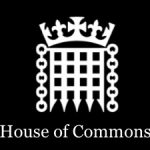
Introduction
In the previous articles, I have set out the very basics of how law and governance is set up in a country, and I have evidenced much of what has been laid out there. Most of the general population are confused as to what a country really is, or how it is they got involved in the government of that country. After reading the previous articles, you should now have a clearer idea on what your role is in governance, and understand unequivocally, that a country is a legal fiction, and so are persons, legally speaking. This information is essential to understanding law, and is fundamental to everything that I will go on to explain from here on in.
This article [ Part 1] will very briefly outline the route map most people take when they get involved in the legal system, and governance. It will succinctly tie together and summarise articles #3 and article #4.
Part 2. of this article is a more detailed look at this subject. Part 2. comes as a book that I have written which explains this, and much more in far greater detail; my book is available to Capillary Wave members.
The People Have Been Re Presented
From People To Personage (bondage)
When you register to vote you consent and volunteer to be represented by Members of Parliament (MP’s).
In the UNITED KINGDOM there is an Act of Parliament called the: Representation of the People Act 1867 whereby it states that a “Man” is entitled to be registered as a voter. However in doing so, that “Man” then becomes a person and citizen of the UNITED KINGDOM, and is then seen as an agent, and employee of the Crown as per the various legal definitions of: person that I have previously provided. That person is then given a new rank and title in its new society.
UNITED KINGDOM, is the title of a corporate polity that operates out of Britain. Britain is the landmass, and UNITED KINGDOM is the title of the corporate body (a legal fiction).
Your act of registering to vote, and voting, makes you a person, a citizen, and an employee of the corporate body titled: UNITED KINGDOM. All of the [laws] policies for that corporate body are known as Acts and Statutes, and they now apply to the person that you have now become (the hyperlinked definition of “become” is very telling – befall).
You walked away from the capacity of being one of the people and that jurisdiction, to become one of many persons of a district, of a country, under a new lord, and have acquired a new status, as part of the body of government.
This is precisely why the name of that Act: The Representation of The People Act 1867, states that the action of registering to vote, re – presents people. It is not the re – presentation of persons; but people. It re – presents people as persons. You start off as people and are re – presented as persons. You start out at Britain and that jurisdiction [lawful] as a people, and then enter the legal UK jurisdiction as a person.
represent (v.)
late 14c., representen, “show, display, express; bring to mind by description,” also “to symbolize, serve as a sign or symbol of (something else, something abstract); serve as the type or embodiment of;” also be a representative of” (the authority of another).
The Monarch serves the people, and rules over his or her persons. Two hats for the two different offices and jurisdictions, as discussed in previous articles here, and as evidenced at the Queen’s coronation in the link below:
- Index Jump To: Person
Both Political Wings Belong To The Same Corporate Bird
If you registered to vote there is written evidence that you have confused your name [explained in Article #1], given your signature and signed an application form. Ultimately, this means that you have left the lawful jurisdiction of Britain as a people, and consented and asked to join the legal system of governance as a person. Even if you subsequently fail to vote, or stop voting in any future elections, that consent is still evidenced, until it is rescinded by you. You are now in a new feudal type of relationship, under a new lord, as explained and evidenced more here in Article #1.
If you do partake in governmental elections, and let us say for arguments sake that you vote for the red party, because they are anti war, but the blue party gets in, who are pro war; the blue party will now have your full volunteered consent, and authority via your act of voting, and the stipulations of the Representation of the People Act 1867, to do as they please, including say; starting a new war, even though the party you voted for were against starting a war. The party who want war, now have your consent to go to war in “your name”; and the war will also now be funded by you as an income tax paying citizen of the UK. As an addendum to that; income tax was brought in to existence to fund war(s), and to my knowledge, it still provides that backing:
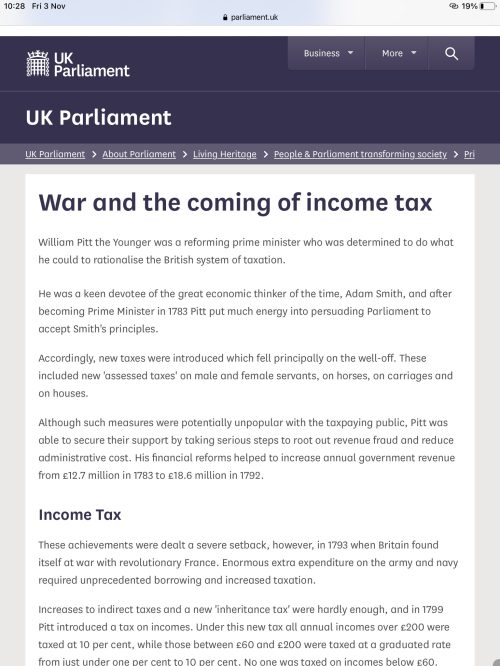
Both political wings belong to the same corporate bird (body), and the corporate bird has an Executive branch, and a Crown to control it; the corporate body will ultimately go wherever the head (Crown) wants it to go. That is why government departments are known as a body, and the Crown is the head of the body – thus comprising a whole person of which you as a UK citizen make up a small part of that corporate body – something for the Christians to ponder, especially as you are called to be a part of the body of Christ, not the body of Parliament
The inferior legal system is a mirror image of the righteous lawful one. I have no doubt whatsoever that this is the reason the famous book by Hobbes: Leviathan, features on the above link for “polity”. A monster / dragon made up of many member parts. I have heard Jacob Rees-Mogg refer to this book on occasion at Parliament, he has referenced it whilst talking about constitutional matters.
The various government bodies do the actions, the doing, the acts; and the Crown do the thinking, the strategising, and planning. That is also why some companies have a “head office”- that is where corporate strategy is thought up; in the head.
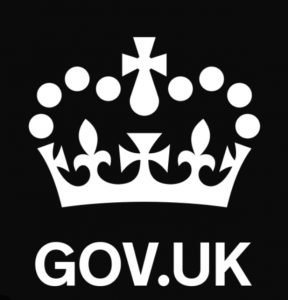
The above describes what the act of voting does. Now I will tell you what voting is. This again may be extremely relevant to those persons that might consider themselves “Christians”:
A vote is a vow and a vow is a “pledge to a deity”. A deity is a god. Logically then, the act of voting is a pledge to another god, a different god, and not The LORD God. Have you ever heard of the biblical saying “no man can serve two masters”? – Matthew 6:24, KJV 1611. Those actions go against the commandments and teachings in The Bible:
• Exodus 20:3, KJV 1611 – Thou shalt have no other gods before me.
• Leviticus 27:2, KJV 1611 – When a man shall make a singular vow, the persons shall be for the LORD by thy estimation.
• Matthew 7:21, KJV 1611 – Not every one that saith unto me, Lord, Lord, shall enter into the kingdom of heaven; but he that doeth the will of my Father which is in heaven.
We have already discovered that The Bible, KJV 1611, is The Supreme Law above all else, and the Law to which all governments adheres.
When you vote, you attorn, and to attorn is to transfer allegiance, or homage to another lord (which is why it is against the Commandments). So if you registered to vote and or vote in an election, you attorned, and turned your back on God and pledged allegiance to another god. Why do you think there is an “Attorney General” in governance? An office dedicated to oversee all of the attorners, of which there are many:
• Matthew 7:13, KJV 1611 – Enter ye in at the strait gate: for wide is the gate, and broad is the way, that leadeth to destruction, and many there be which go in thereat.
• Matthew 7:22, KJV 1611 – Many will say to me in that day, Lord, Lord, have we not prophesied in thy name? And in thy name have cast out devils? And in thy name done many wonderful works? 7:29 – For he taught them as one having authority, and not as the scribes.
Voting also makes you a person, as stated in the 1867 Act, and The Bible has something serious to say about that too:
• Job 32.22 -22, KJV 1611 – Let me not, I pray you, accept any man’s person, neither let me give flattering titles unto man. For I know not to give flattering titles; in so doing my maker would soon take me away.
• Job 13:10, KJV 1611 – He will surely reprove you, if ye do secretly accept persons.
• Romans 2:11, KJV 1611 – For there is no respect of persons with God.
• Proverbs 24:23, KJV 1611 – These things also belong to the wise. It is not good to have respect of persons in Judgment.
• James 2:9, KJV 1611 – But if ye have respect to persons, ye commit sin, and are convinced of the law as transgressors.
• Acts 10:34, KJV 1611 – Then Peter opened his mouth, and said, Of a truth I perceive that God is no respecter of persons.
The above message about persons from The Bible can be heard when judge Kavanaugh takes his oath as a Supreme Court judge in the video link below, when he affirms he will be “no respecter of persons”. More evidence of the supremacy of the Word of God and that The Bible contains The Law. So here you have a judge who presides over the legal and lawful jurisdictions swearing on oath to be “no respecter of persons,” which is the very thing that every citizen of a country is: a “person”.
• Supreme Court Judge Brett Kavanaugh
It is clearly not good to be a person by any measure of the law. Yet most of you reading this will be citizens of your relative country, and have therefore elected to become persons of your own free will.
Civil law, the law that governs the citizenry, is Roman law. Something else for Christians to consider. It is my considered assertion that Rome never went away, which I am sure I will get in to in another article here.
Goodbye people, I am leaving Britain For The UK
If you have ever registered to vote, you have given the legal administration of a country your consent to be governed. There are other instruments and mechanisms this can happen with as well such as:
• Applying for a National Insurance Number (which is your employee number), which requires a “Birth Certificate” as a means of identity.
• Using a “Birth Certificate” to identify yourself.
• Contributing to your state pension (only an employer can operate a pension scheme).
• Voting in local and national elections.
[Article #1 goes in to this area of discussion in much more detail].
By voting, you have given your consent to be governed, and by voting you elect an MP to be your representative at Parliament, where amongst other things your representatives make the laws on your behalf; these are the laws which govern you. If you ever find yourself in a magistrates court, you will most likely be there because you broke the very laws which you enacted.
Registering To Vote
Further to the discussion in Article #3, registering to vote also means that you leave the capacity of a people on the landmass known as Britain, and you opt to be a member part of the corporate body of the: UNITED KINGDOM (UK). Perhaps now you will be able to notice these subtleties in the below photographs taken from the UK voter registration process which can be viewed here:
In reality you are not born a UK citizen. In reality you are born on Britain as one of the people. You can not be forced to be a UK citizen; you can only believe that you are (remember a legal fiction exists only in the mind). You can be persuaded, but not forced to become a UK citizen. You are not therefore already a UK citizen; unless you believe [mind] that you are. In reality you do not start out as a UK citizen; as you will see, you start off in the jurisdiction of Britain. You have to voluntarily opt in and believe that you are a UK citizen to become a person of the corporate body: UNITED KINGDOM – it is all fictional. That is probably a lot to wrap your head around if this subject is new to you. Remember, legal fictions are not real. They are a creation of the law and exist only in your mind. Now you may better understand what the word Govern-ment breaks down to, and means:
• Govern. To control
• men. Is of the mind. As in men-tal, men-sa
men- (1)
Proto-Indo-European root meaning “to think,” with derivatives referring to qualities and states of mind or thought…It is the hypothetical source of/evidence for its existence is provided by: Sanskrit manas- “mind, spirit,” matih “thought,” munih “sage, seer;” Avestan manah- “mind, spirit;” Greek memona “I yearn,” mania “madness,” mantis “one who divines, prophet, seer;” Latin mens “mind, understanding, reason,” memini “I remember,” mentio “remembrance;” Lithuanian mintis “thought, idea,” Old Church Slavonic mineti “to believe, think,” Russian pamjat “memory;” Gothic gamunds, Old English gemynd “memory, remembrance; conscious mind, intellect.”
mens rea in law is to do with: intent, and whether the intention of someone is criminal or not. to have a guilty mind.
There is a battle for your mind, and the govern-ment do precisely that; govern the mind (if you let them). Most of the legal difficulties anyone faces are merely a perception you have, that you are in a legal fix. Trust me when I say – you are not.
Note: Those of you who have read the “About Section” here will be aware of my own legal situation around the year 2007/08. When I came to understand some of these key, fundamental points, my legal worries began to fade away. I was a carpenter. I had no knowledge of the law, or governance, and nobody I knew did either. All I had to examine were words and some legislation – much as I have presented for you in these articles. Everyone I asked disagreed with my findings, and thought “I was mad”. All I had to go on was word definitions, that is why they feature so strongly here. When I started to explain some of what I discovered in letters to my legal adversaries, they started to back off and go quiet. When I tell you that it is a battle for your mind; it really is. It all comes down to your perception, what you believe, and there is a lie at the heart of a be-lie-f.
Give This Some Thought…
Something that you are going to have to get to grips with if you are studying law and governance, is the fact that legal fictions only exist in your mind. They are a contemplation of the law, and do not exist in reality. Since persons [at law] are legal fictions and the UK and its citizenry are both persons, there is no way that people can live in the UK – unless they believe that they do – this is all to do with your mind, your conviction. What you believe.
Here is an excerpt from the: HARVARD LAW REVIEW, and its findings on legal fictions are scathing – for good reason, as I hope you are now beginning to understand.
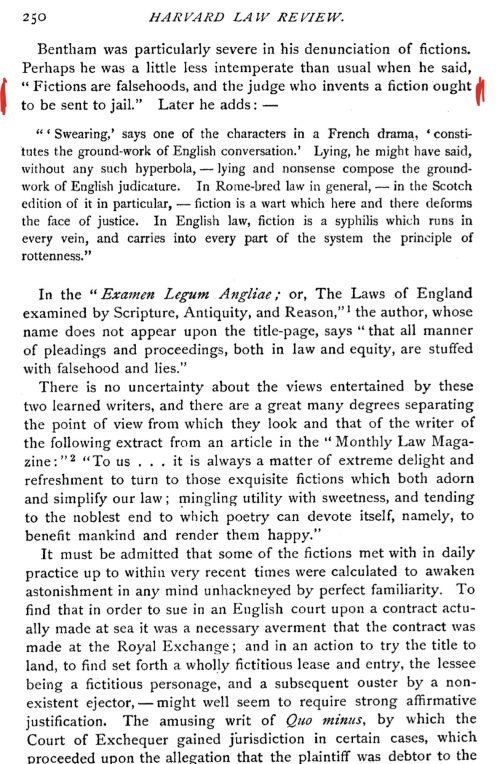
This is why at court persons get convicted upon the convictions they have. My own convictions however are not the same beliefs as UK citizens, therefore I can not – and will not – be convicted upon their beliefs. What we have evidenced here is, that much of what the UK citizenry believe, is make-believe; not real. That statement may need some time to absorb; it is highly important, and very relevant. I will go in to this much more in my article on “The Two Main Jurisdictions”.
The online voter registration process for the UK (It will be the same set up in other countries)
Before we get in to the relevant steps of the voter registration process, let us set up the situation properly. The right to vote is something all UK citizens and people have. Not all UK citizens take up their right to vote; and many do. In the same way a prisoner has a right to an hour on the exercise yard, not all prisoners take up that particular right, but they are nonetheless still a prisoner.
The voting system allows citizens to send their representative to Parliament, to make the societal rules that govern them. If you vote you get to have a say in how you are governed, and simultaneously consent to that system. If you are not a UK citizen involved in this voting process, below are the steps you can take online to join that legal system.
Clearly, if you are not currently a UK citizen, but wish to join that society, then there is a process you are going to have to go through, and finding out from whence you came is part of it. Therefore, for those people on the British Isles who wish to become persons of the UK, these are the steps which will confirm to the UK administration, that you believe yourself to be a UK citizen:
1. Step one of the online voter registration process. Which is a process of transgression, given everything we have just been discussing here. You start off in the jurisdiction of Britain as one of the people. This entire process is to get you to believe, consent, accept, and admit to the jurisdiction of the UK, and become one of its persons. It has to be this way because the UK legal infrastructure only has jurisdiction over its UK persons. So this process will steer you to volunteer the information they need that will also guide you to identify yourself as a UK citizen; that is; one of their citizens; and if you ever use their “Birth Certificate” to identify yourself, you are already climbing on board their citizen-ship – This is explained in much greater detail in Article#1.
citizen (n.)
…Sense of “freeman OR inhabitant of a country, member of the state or nation…
So you can be a person , a citizen of a state (polity) OR, a people, a citizen of a nation.
Persons belong to a polity, and people belong to a landmass (Britain in this case).
nation (n.)…c. 1300, nacioun, “a race of people, large group of people with common ancestry and language,”…
- Index Jump To: Country
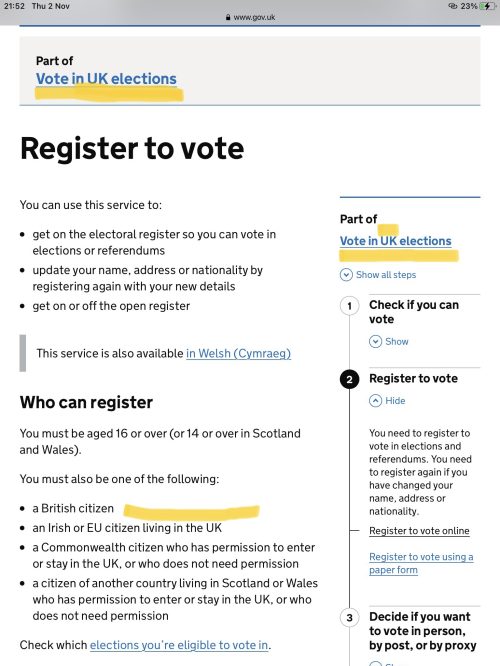
2. Step two: so far, all still relevant to the people of the British Isles. The landmass. The people.
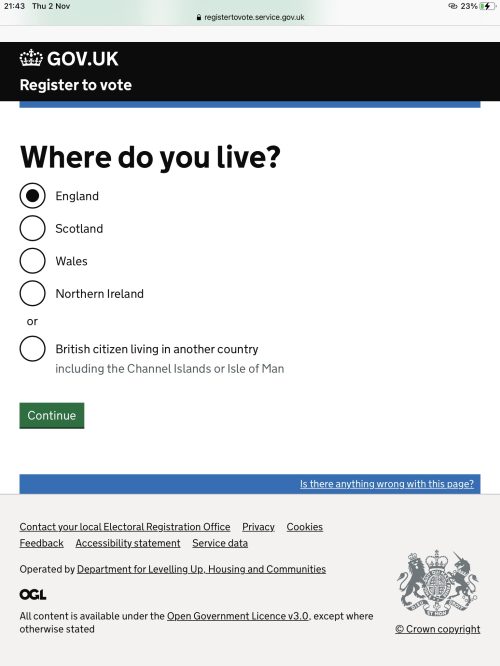
3. Up to this point the questions are still relevant to the landmass. Because you have to “come to the UK” from somewhere real, and they need to know where that is. This will now change. You are about to “go through the Portcullis” [the portcullis is not a part of the registration process but I have added it as both a visual aid, and a literal one]. When we go through the portcullis we will be “in the UK” and we will be dealing in entirely UK jurisdictional matters. They will need you to admit to, and submit to being in the UK. Each question will now get you to unwittingly admit to; and confirm to them that you are indeed a person of the UK.
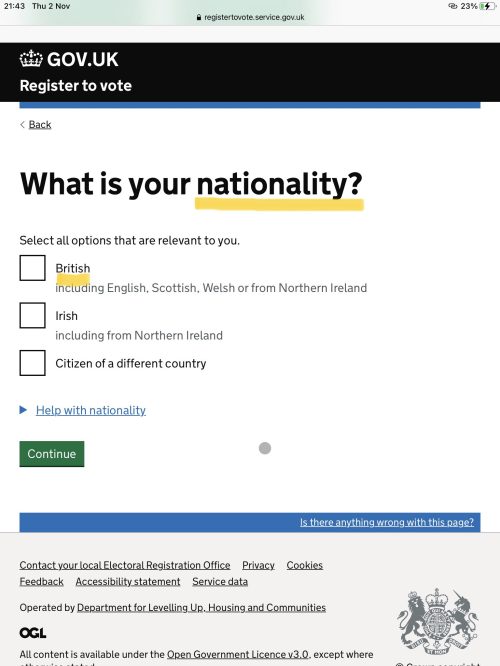
3.5 [This step is not part of the online registration process but I added it here for explanatory reasons] Through the Portcullis in to UK jurisdiction as a commoner [belonging to The House of Commons]

4. Here we are now entirely dealing with UK jurisdictional matters. There are now no more mentions of Britain as that is now irrelevant as we have passed “through the portcullis” in to UK jurisdiction. By filling out these questions you will be confirming the status of a UK person “living in the UK”. Some of these points are explained in more detail in Article #1. Welcome to the UK. Welcome to the Govern-ment.
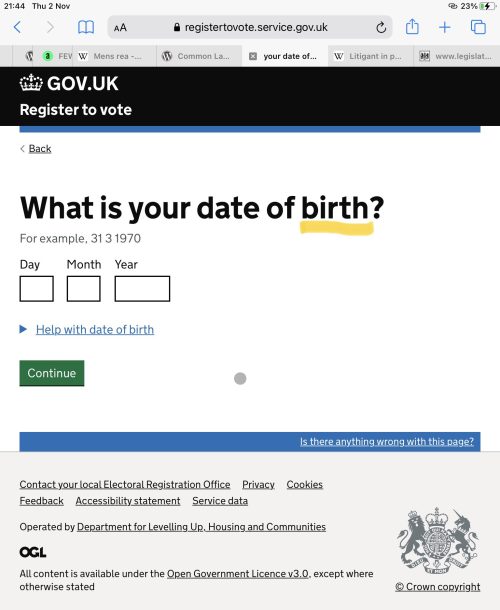
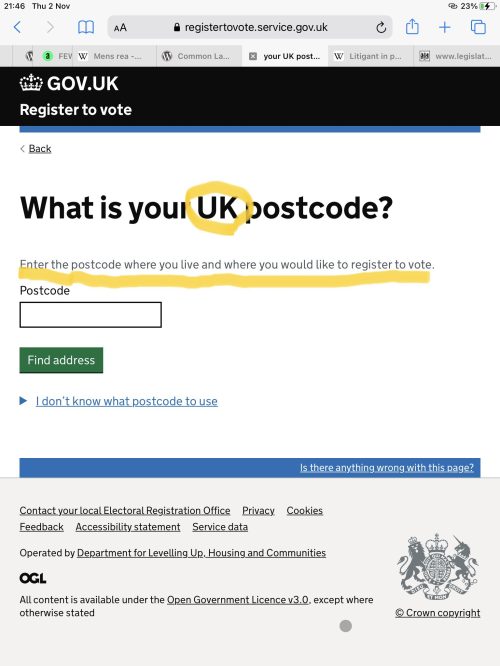
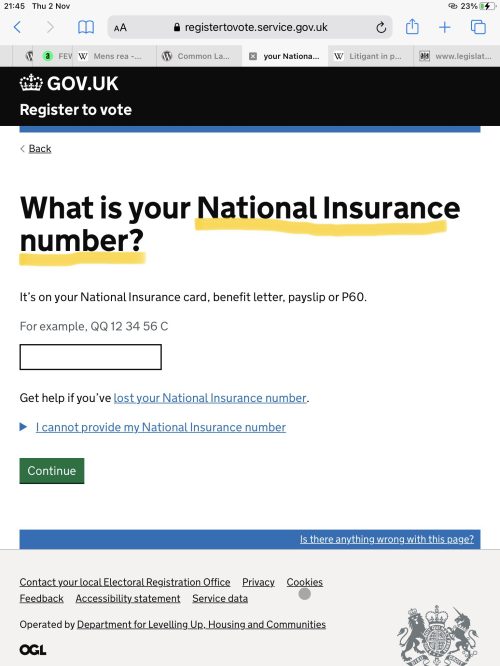
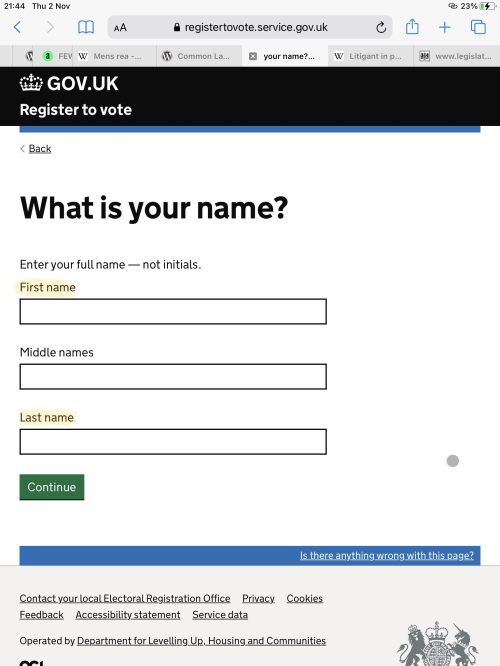
Application For a National Insurance Number
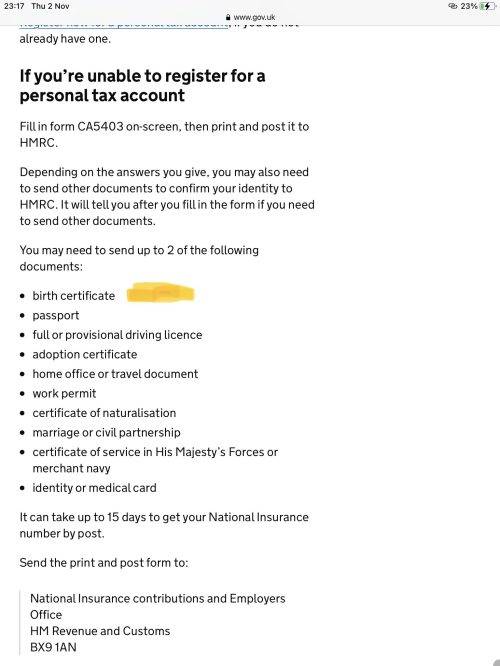
As you will now see, your nationality can not be; and is not the: UNITED KINGDOM (which is ironic as this is an application for a “National Insurance number”). Your nationality can not be UNITED KINGDOM because you can not be a people in the UK; that is impossible. The UK is not real and needs fictional persons to be its citizens, and not people, as evidenced in the previous articles, and above in the word definitions, and below in the registration process itself:
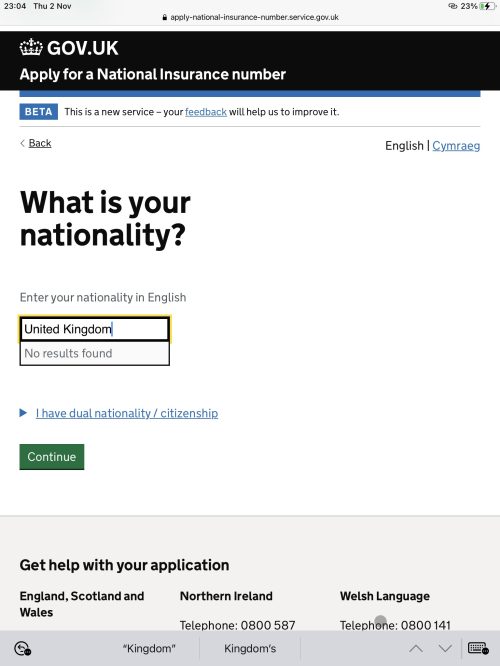
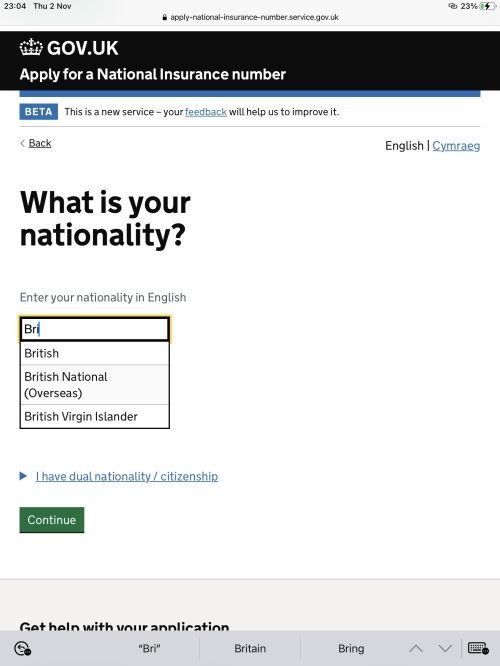
I am not going to go through the whole process here. I have made available publicly heaps of evidence in these articles for you to start to research for yourself. My aim here is to show you the outline, to show you the ropes, and the main principles, so that it will help you better understand how precisely you are being governed, and what the specific mechanisms are of that system.
The Birth Certificate – Your Ticket Of Entry
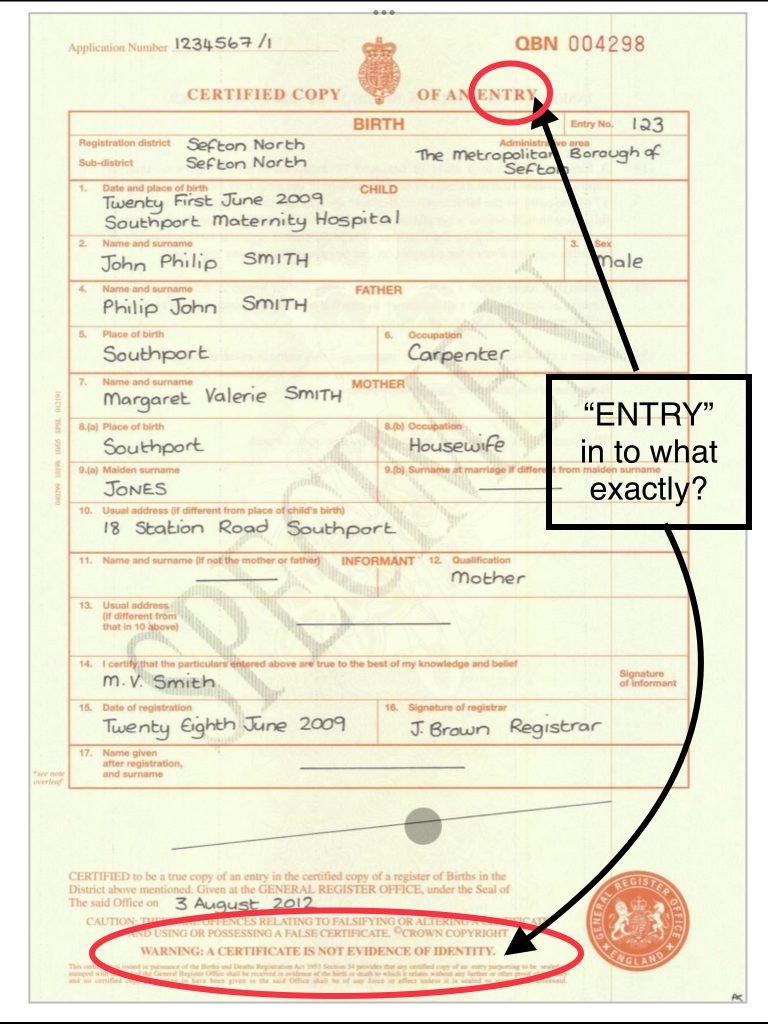
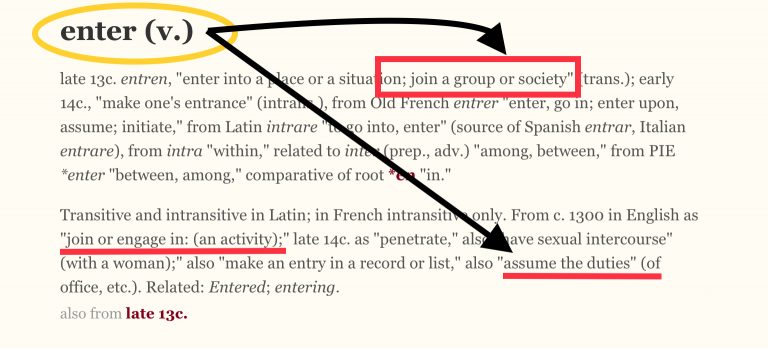
The first thing to note about the “Birth Certificate” is that nowhere on the document does it refer to itself as a Birth Certificate. It is not a “Birth Certificate” as it is commonly called, it is in fact, and self evidently, a “CERTIFIED COPY OF AN ENTRY”. Which then begs the question: Entry in to what exactly?
If this document were called by its proper name, then more people might question its true meaning, and understand its proper use. As always it is the word definitions themselves that explain the full story.
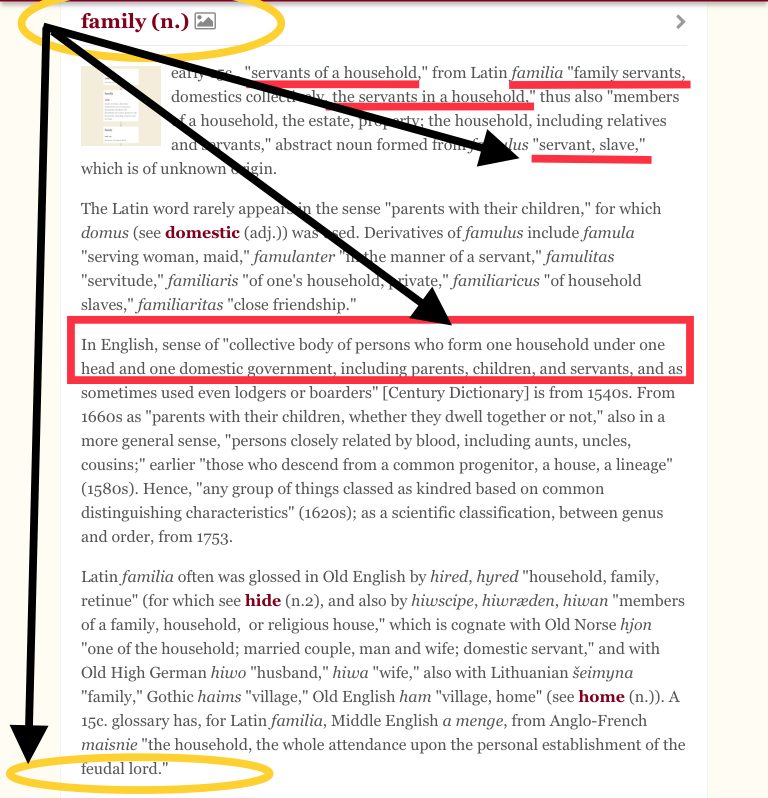
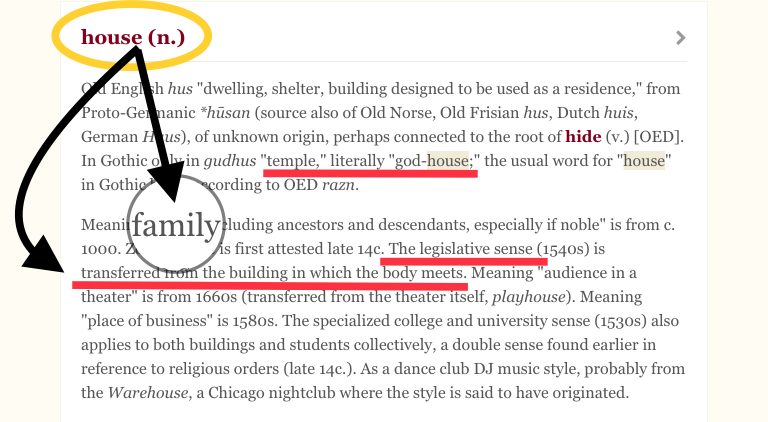
The word definitions, and their synonymous words explain precisely what in fact the CERTIFIED COPY OF AN ENTRY is. This information aligns perfectly with everything else which is explained, and importantly, is evidenced in these public articles here. There is a more detailed analysis of the CERTIFIED COPY OF AN ENTRY in my article From Grace To Fraud.
I hope that you have enjoyed Part 1. of this article which has hopefully given you a good insight in to some of the processes, with which you consented to be governed, and what has happened to you within that process, and what it will mean for you legally speaking.
If you feel that others would benefit from reading this article, please consider sharing it. If you would like to find out more about law and governance then you can start by reading my articles in ascending numerical order which will garner the best results for you.
More articles on Law and Governance can be read from the menu below.
If you feel like buying me a coffee, or making a donation, that would be greatly appreciated.
In good faith
CME